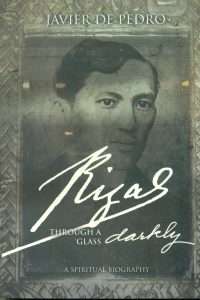This article was first published in the Philippine Daily Inquirer on June 16, 2018. Banner photo from stmvictoria.org.
As the birthdate of Jose Rizal approaches this year (June 19) amid many public attacks against the Catholic Church, we should ask: Can one admire Rizal—who criticized the Catholic Church—and defend the Catholic Church at the same time?
The book Rizal Through a Glass Darkly by Fr. Javier de Pedro enlightens. The book, a “spiritual biography” of Rizal, traces his journey from his childhood piety to his estrangement from the Catholic faith, to his repentance before his execution. The author is a Spanish priest who has fallen in love with the Philippines, having ministered here for many years, and has extensively and thoroughly studied Rizal’s life and works.

De Pedro ascribes Rizal’s hostility, at one point in his life, toward the Spanish friars in the Philippines to a combination of exposure to the intellectual trends then current in Europe, living far from his family at an impressionable young age, youthful pride and ambition, and imprudent readings. The book acknowledges that Rizal had legitimate grievances against clergymen, rooted in experiences that outraged his sense of justice.
Ironically, one thing that led to abuses by the friars was that they performed functions indispensable to development. They were “founders of towns and cities, educators, builders of roads and bridges, philologists and scientists, doctors and pharmacists, introducers of crops and farming techniques, etc.,” the book says. Unfortunately, they clung to these functions even when Filipinos were ready to take them on by themselves. This led to unwarranted privileges for clergymen and tensions between the friars and the emerging bourgeoisie, among others.
Rizal’s initial hostility toward the friars notwithstanding, he kept traces of his childhood faith amid his spiritual crises. De Pedro convincingly argues that these seeds planted in Rizal’s childhood ripened into his last-minute conversion before his death, when he sincerely retracted his anti-Catholic writings and “received long ago the welcome of the Father to the house of Heaven.”
The author also notes that Rizal’s analysis of the problems of the Philippines matured throughout his life. Between writing the Noli and the Fili, he realized that it was simplistic to ascribe all of the country’s problems to the friars, and that Filipinos themselves must share responsibility for the country’s problems. In fact, one of his reasons for writing the Fili was to show this evolution in his thoughts.
Rizal died no less a hero despite having repented of his former staunch anticlericalism. To emulate his patriotism, it is unnecessary to imitate his one-time hatred for clergymen. Unfortunately, many of his admirers fixate on it, to the exclusion of his other thoughts and other features of his life.
Rizal’s legitimate grievances against the imperfections of clergymen do deserve attention. At the same time, the Catholic Church deserves due process in the court of public opinion. But the opposite has become the norm: The Catholic Church is presumed guilty in the face of accusations, her side on issues seldom aired and understood, and her critics seldom subjected to the same scrutiny as her advocates.This matters because truth matters. The ideals for which Rizal himself fought cannot be achieved by spreading untruths and exaggerations about an institution of Philippine society that plays a major role in the lives of Filipinos.
The issue is not only the stature of Catholicism in the Philippines, or increasing or diminishing Rizal’s glory. It is [also] about having a truer, fuller picture of ourselves as a nation, about our institutions and our heroes. Without this, we will be unaware of our strengths and weaknesses as a people. We will be blind to both our achievements and mistakes, and, thus, unable to make wise decisions about our future.
Thus, in evaluating the Catholic Church, as with evaluating our heroes, we must look at both the shadows and the light. Only the full truth will guide us toward the ideals our heroes aimed at for our country. #
Atty. Cristina A. Montes holds degrees in humanities specializing in philosophy from the University of Asia and the Pacific (1997) and in law from the UP College of Law (2005) and the Universidad de Navarra in Pamplona, Spain.
Leave a Reply